How to Use SEO to Market and Grow Your Business
Article by Colette Nichol, Story Strategist, SEO Expert, and Solo Filmmaker
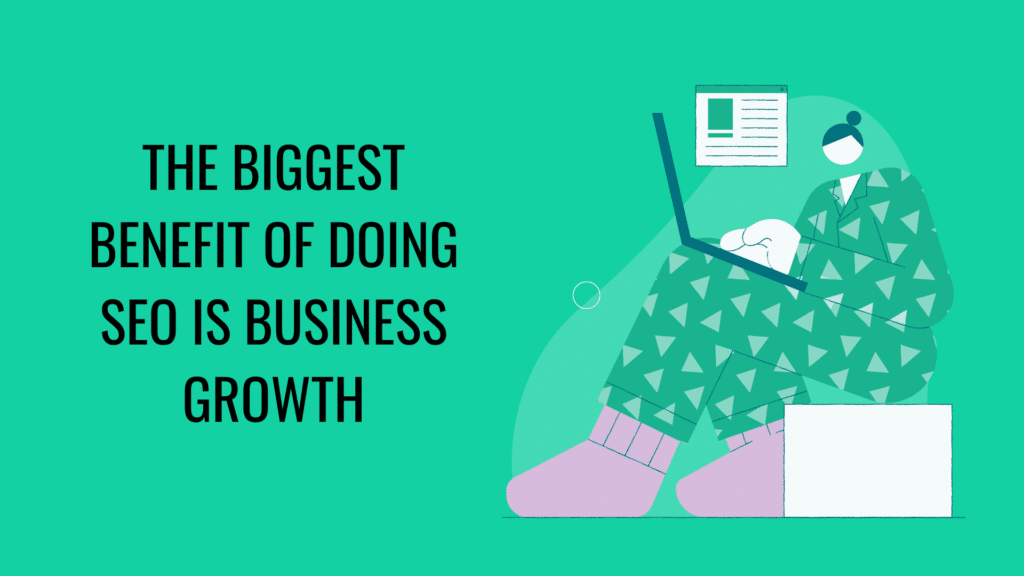
SEO is one of the best tools for small business marketing.
Getting your website to rank at the top of various search engines will bring you more traffic, which you can turn into leads, prospects, sales or email subscribers. But before you start any SEO strategy, you must know the revenue potential and pitfalls of SEO as a marketing tool.
SEO refers to optimizing the content and structure of your website so you can get your most important pages on the first page of Google and other search engines.
Technically speaking, Search Engine Optimization isn’t a marketing tool.
It’s more similar to renting real estate than creating a traditional marketing campaign. Doing SEO successfully and getting onto the first page of Google is like renting a corner property across from the beach for your taco shop.
If you open a brick-and-mortar business, you won’t set up shop in some dark alleyway that’s nearly impossible to find. Yet, that’s what most digital business owners do with their websites.
They run ads to a website that isn’t getting any organic traffic.
When they turn their ads off, their traffic stops. This might be fine in the short term. But in the long term, you want to earn traffic by having unique content and a well-structured website that can attract your ideal customers and clients.
Table of Contents
- Your Business Isn’t Getting Found Online, Now What?
- Keyword Research Basics for Small Businesses
- How To Know if Your Small Business Needs SEO
- Benefits of SEO for Small Business Growth
- Monthly Revenue vs. Lifetime Customer Value
- Organic Social Media vs. Organic SEO
- Paid Advertising vs. SEO
- Using Organic SEO Strategies To Grow Your Business
- Measuring SEO Results
- SEO Is Expensive…Will It Be Worth It?
- Calculating Potential ROI for Your SEO Investment
- Are Your Competitors Doing SEO?
- SEO Tips for Small Businesses To Get on the First Page of Google
- Why Local SEO Is Important for Some Small Businesses
- How To Improve SEO for Small Businesses
- The Bottom Line: Should You Do SEO?

Your Business Isn’t Getting Found Online, Now What?
Most of the traffic and sales happen when you get into the top four positions on the first page of Google.
So it’s essential to know how competitive your niche is and what it will take to get into those top spots before you get started.
If you’re not getting found online, you need to start by doing basic keyword research for your niche.
When doing the keyword research, you’re looking to answer the following questions:
1) How much potential volume is there in my niche?
2) How competitive is my niche?
3) When I look at the content other websites in my niche produce, do I find it compelling or weak?
4) How much are people spending on ads in my niche?
OK, but why are these questions necessary, and how will you determine the answers? Let’s dig into that by looking at the basics of keyword research.
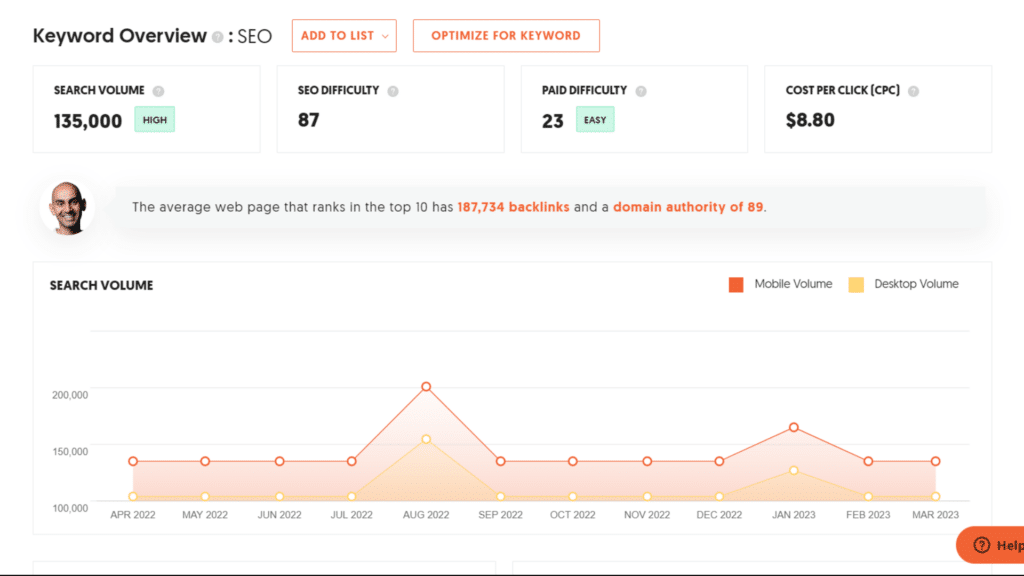
Keyword Research Basics for Small Businesses
To start doing keyword research for your business, start by getting a free or low-cost account with Ubersuggest.
Even though SEMRush and Ahrefs have fantastic tools, they’re too complicated for someone just starting with SEO. So I don’t recommend using them to do basic keyword research.
Great, you’ve got your Ubersuggest account going; now it’s time to brainstorm and research.
1) Type in keywords related to what you sell.
2) Add all the relevant keywords to a keyword list.
3) Look at the related keywords for everything you search, and add anything good to the same keyword list.
4) Start with big umbrella topics, then look up more niche topics.

Once you have a big list of potential keywords, look at the total volume.
You can export your list to a CSV file and add the volume column to get a “total” volume number.
Then look at the CPC (Cost per click) of your keywords. Which keywords are people paying over $5 to advertise on? Do they also have a volume of 500 or more? If so, give these keywords a star! They could be valuable.
Next, look at the competition, which in Ubersuggest is called the SD.
The SD stands for Search Difficulty, and you’ll usually start with keywords below 45.
Can you identify any keywords that have a search volume of 500 or more with a CPC of $5 or more and an SD of 45 or below?
If so, that’s keyword gold!
Keyword Gold
Keyword Gold is when you discover high volume, low competition keywords that have a good CPC.
To translate that into regular-person language: keyword gold refers to search terms that A LOT of people are typing into Google, which are so valuable that many advertisers pay over $5 per click. Yet, almost nobody creates high-quality content for these keywords, making them low competition.
It’s not unusual to find keywords with a high CPC (Cost Per Click) but very low organic competition.
It can be difficult to convince a business owner to allocate resources towards creating (i.e. writing and designing) content. It’s much easier for a marketing agency to sell a package that involves zero work from the business owner. However, you can’t earn traffic organically without helpful, high-quality content.
That’s why it’s not uncommon to find keyword gold, even though SEO has been around for a long time.

How To Know if Your Small Business Needs SEO
The easiest way to know your small business needs SEO is to open up Google and start searching topics in your niche.
What comes up?
Does it seem like you’re missing out on traffic?
The next step is to do keyword research and identify the potential volume you might be missing out on and how valuable that traffic is.
After that, I recommend you speak with an SEO consultant or expert to help you decide whether or not to move forward.
Most good SEO consultants will not take on a client they don’t think can succeed. So you have a high chance of getting good advice about whether to move forward or not.
An SEO consultant can quickly search for topics in your niche and review your website. They can tell you if your niche has a ton of potential or not.
What Is an SEO Consultant?
At this point, you might be wondering what an SEO consultant is and why they are important.
An SEO consultant is an expert at optimizing a website’s visibility on search engines. They apply industry-specific knowledge to increase organic search engine traffic, aiming to improve a site’s rankings in search results.
They conduct in-depth website audits, perform keyword research, analyze competition, and implement SEO strategies. SEO consultants guide the architecture of websites and content strategy. By understanding how search engines work and staying updated with the evolving trends, they help businesses reach their target audience. In simple terms, they help increase website traffic with the goal of boosting sales and growth.
Benefits of SEO for Small Business Growth
The biggest benefit of SEO for small business growth is that you will get targeted traffic.
If your website is well structured and has a good conversion rate, this traffic will increase sales. SEO is among the highest ROI tools available to marketers and small businesses because the traffic you attract is ready to buy.
Typically to do very well with SEO, you can’t just target people at the end of the customer journey.
You usually also have to create informational content for people at the beginning stages of the customer journey. Nonetheless, your traffic strategy ensures that people ready to buy land on your website.
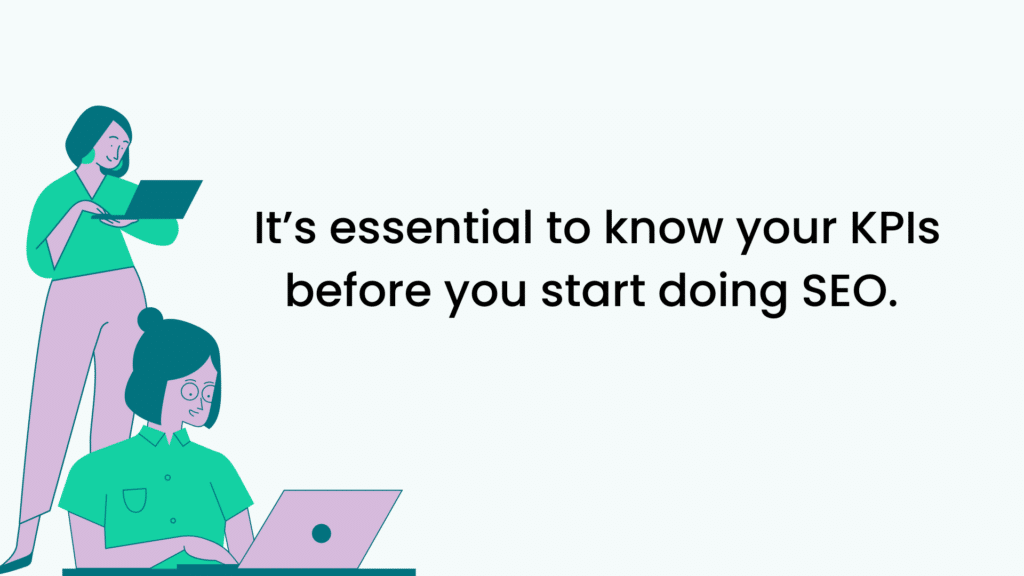
Monthly Revenue vs. Lifetime Customer Value
From a basic standpoint, imagine you could spend $5000 monthly on SEO but generate an additional $20,000 monthly in sales.
Now imagine that every $20,000 sale was a customer who would have a customer lifetime value of $200,000. That monthly spend of $5000 is now bringing you $200,000 per month in lifetime value.
You might expect this if you have a high-ticket service where any new client represents a lot of additional value. Moreover, these aren’t fantasy numbers. This is a real example from one of my clients.
Next, on the lower end, imagine you sell a service costing $5000 per year, and you spend $1500 per month on SEO.
Within 18 months, you’re bringing in 3000 targeted visitors to your website.
.25% of those visitors schedule a 15-minute call. 30% of those 15-minute calls turn into a sale. You’re now adding $11,250 per month in sales. Now let’s say the lifetime value of every new customer is $15,000. From that perspective, your $1500 monthly investment in SEO brings you $33,750 in lifetime value every month.
The biggest benefit of doing SEO is business growth.
But first, you have to know your numbers, and not every business is sitting on keyword gold. Before you invest heavily in SEO, you need to find out what the SEO potential of your niche is.

Organic Social Media vs. Organic SEO
Organic social media can be a valuable way to build your audience.
However, the moment you stop posting, your traffic and leads stop. That’s not the case with Organic SEO. One of my clients got so busy with all the new leads their SEO work generated for their business that they didn’t create any new content for 8 months.
The traffic didn’t stop. The leads didn’t dry up.
Yes, their traffic dipped by 20%.
But despite that traffic dip, they kept getting more leads and making more sales. They couldn’t have stopped creating content for eight months if they had relied on organic social media for their incoming traffic. They could have, but they wouldn’t have continued to grow their business.
Paid Advertising vs. SEO
Since only about 30% of searchers click on the paid ads at the top of the search results page.
businesses that only run ads miss out on a lot of great traffic when they don’t do SEO.
If you have a budget for ads, then you have a budget for SEO. And in many cases, you’ll get more traffic and have much greater long-term ROI if you do SEO. That said, I am biased because I don’t love ads, and I do love SEO.
It’s important to look at the keyword data and see how much potential traffic you’re missing out on by just doing ads.
I have a client getting traffic that would cost them $20,000 monthly. This traffic is all due to organic SEO. Not only does this traffic not cost them $20,000 per month, but it converts very nicely into new high-quality clients every month. They have a high-ROI SEO pipeline, all due to their helpful content.
In addition, they have so much valuable content on their website that they don’t have to try hard to close deals.
The people who schedule a call with them are already highly interested and qualified. Their SEO content is both a traffic generation tool and a sales tool.
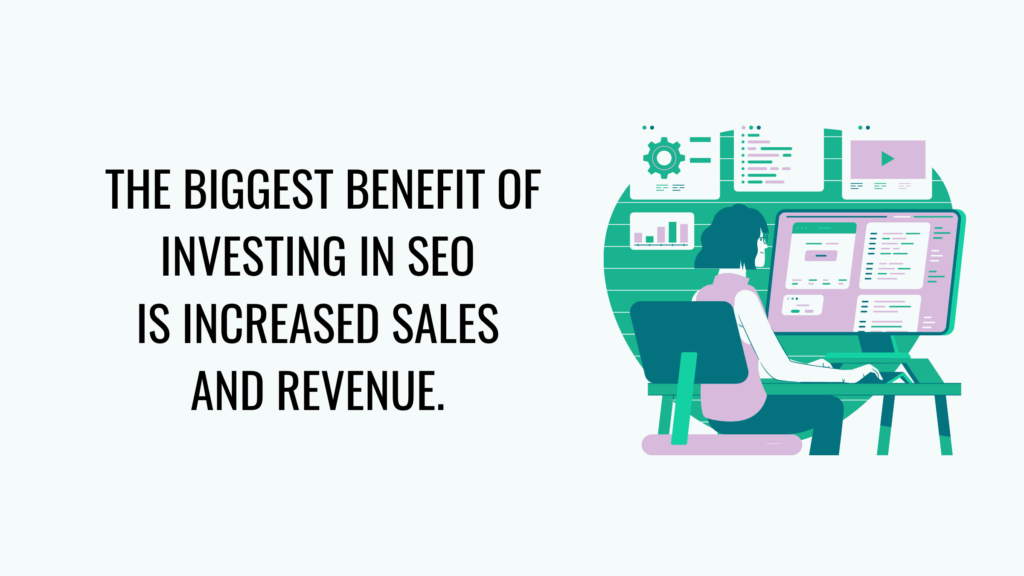
Using Organic SEO Strategies To Grow Your Business
When creating your marketing budget, I recommend allocating at least $1500 monthly to SEO.
You can use SEO to grow your business by focusing on creating informational content and “money” content near the end of the customer journey.
If you’re in a niche where people are actively searching for your products and services, there’s a good chance you’re sitting on keyword gold.
🌟Related Article: Increase Targeted Organic Traffic to Your Website with SEO
Measuring SEO Results
It’s essential to know your KPIs before you start doing SEO.
How will you know if your SEO work is successful? If you’re in a service-based business, I recommend asking everyone who books a call how they found you and tracking that information. Anyone who finds you on Google will remember. I know that sounds odd, but it’s true. People get excited when they find someone great when doing a Google search, so they typically remember.
Next, if you’re in e-commerce or sell a product online, your Google Analytics can be set up to track which sales come from organic traffic.
That said, this isn’t a perfect science. Someone could find you from organic traffic, then get on your email list, and a few months later, they might buy from an email you sent out.
You should usually have a few KPIs. The KPIs you use to measure success will depend on your business model.
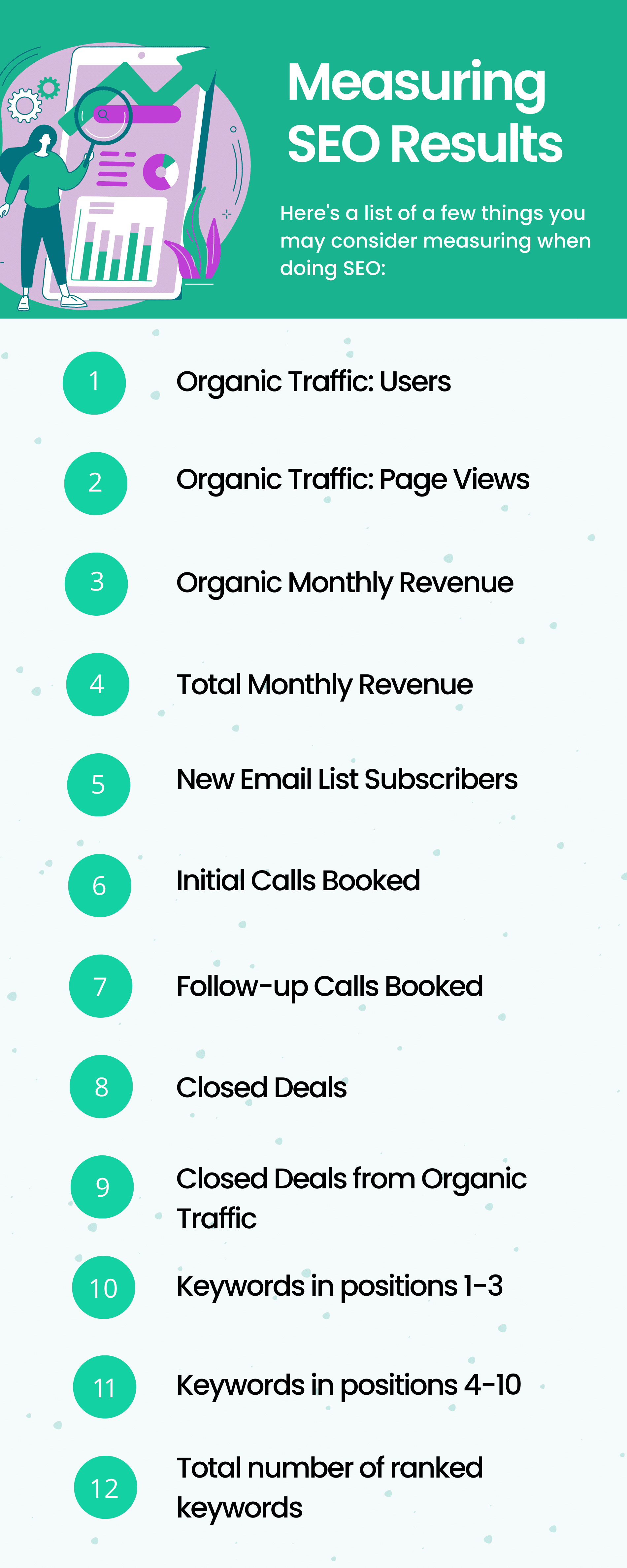
Common metrics when measuring results include:
1) Organic Traffic – Users 2) Organic Traffic – Page Views 3) Organic Monthly Sales
4) Total Monthly Sales 5) New Email Subscribers 6) Initial Calls
7) Follow-up Calls 8) Closed Deals 9) Closed Deals from Organic Traffic
10) Keywords in positions 1-3 11) Keywords in positions 4-10 12) Total number of keywords ranking
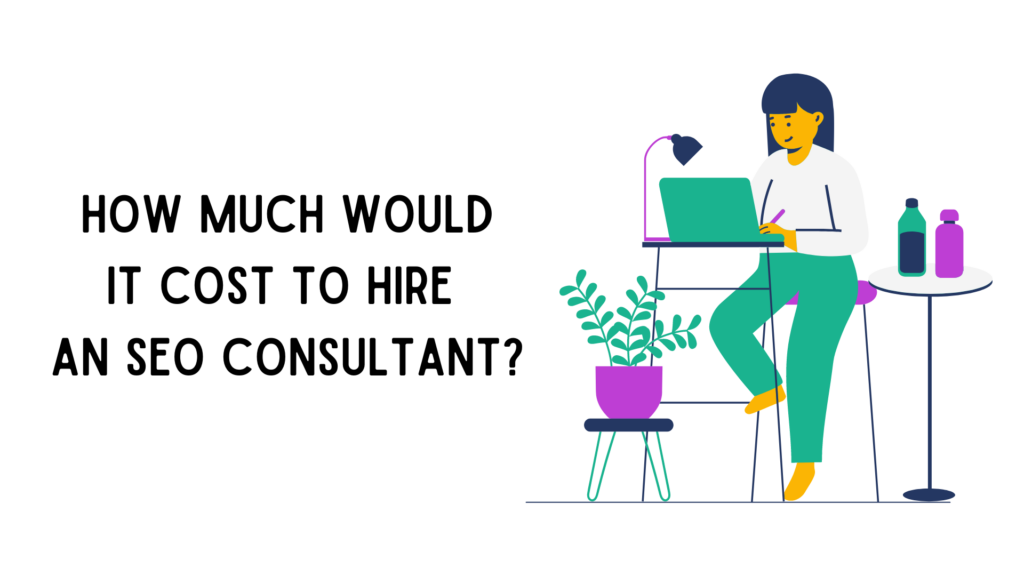
SEO Is Expensive…Will It Be Worth It?
Many people think that SEO is expensive. However, this is the wrong way to think about SEO.
If you’re in a niche with outstanding potential, your SEO work is an investment in future revenue. It shouldn’t be expensive. It’s just like buying some Apple or Tesla stock. You don’t think to yourself, “Jeesh this Tesla stock is expensive.” Instead, you might think, “Damn, this stock will be worth so much more in 20 years!”
The same goes for SEO, except with a shorter time scale.
Depending on how much authority your website already has, you can expect to see results within 6 months of starting an SEO strategy. You will likely see more dramatic results over a 12 to 18-month period. Your SEO investment will pay off if you target the right keywords and create high-quality content.
Most SEO experts aim to help their clients earn much more than the investment because that’s how you retain clients long-term.

Calculating Potential ROI for Your SEO Investment
Here’s how you calculate potential ROI for your SEO investment.
1) Do keyword research and identify the top 50 to 150 keywords you want your website to rank for.
2) Identify the potential traffic volume for those keywords should you get into position #1.
3) Add up all the potential volume.
4) To be conservative, multiply that number by 10%. In this way, you’re getting a volume number that represents 10% of the identified traffic, not all of it.
5) Then, multiply that volume number by your website conversion rate and the average order value.
6) This number represents a conservative outcome.
7) You can do the same with 30% and 50%.
8) Finally, you should calculate the lifetime value this traffic could bring you by multiplying the number of new customers per month (Volume x Conversion Rate) by the Customer Lifetime Value.
SEO ROI Example:
I am selling $1000 handmade leather shoes.
My total traffic potential for the US alone is 100,000 per month.
10% of that traffic is 10,000 per month.
My website currently converts at 1%.
The average order value is $1250.
10,000 * 1% * $1250 = $125,000
This equation shows me that with SEO I could increase my monthly revenue by $125,000.
Next, if each new customer represents $10,000 in lifetime sales, doing SEO could bring my business $1,250,000 per month in added lifetime value.
You have to do the numbers for your business.
And you should do a conservative, medium, and aggressive calculation to see the full spectrum of potential. You should know the potential in terms of monthly sales and lifetime value.
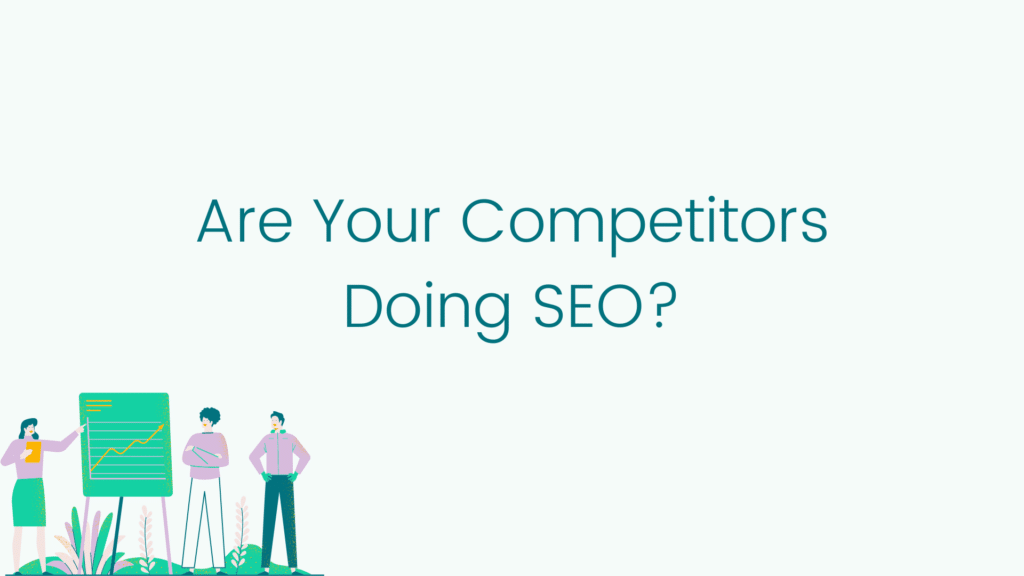
Are Your Competitors Doing SEO?
If you’ve run your numbers and see massive potential for your business with SEO, then does it really matter if your competitors are doing it?
Well, if you’re like me and you’re a little competitive, then yes, it probably does.
Suppose your competitors are doing SEO and not doing it exceptionally well. In that case, you have a strong chance of outperforming them and gaining a share of the traffic and sales. Sometimes, your competitors aren’t even doing SEO, but they’re getting the traffic because their website has more content that’s accidentally ranking.
In fact, I’ve seen this in a few different niches.
Many business owners hear that they should blog, so they create a bunch of content. But none of it is strategic. Nonetheless, they get traffic simply because they have content, and nobody in their niche does. I’ve seen websites getting a ton of traffic simply because the website owner or an in-house expert did a ton of blogging for a few years. But none of it was SEO-based.
So when my client came in with SEO-optimized content, they swept the scene and took a lot of the traffic.

SEO Tips for Small Businesses To Get on the First Page of Google
First, let me be clear that just following a bunch of SEO tips isn’t going to get you the traffic you need to grow your business.
You need to have a clear and logical strategy, and any good strategy starts with keyword research and a clear content plan.
I strongly recommend working with an SEO expert if you’re new to SEO and want to grow your business with organic traffic.
However, if you want some tips, these are my top SEO tips for small businesses:
1) Do comprehensive keyword research, including competitor research.
2) Identify the top 5 to 10 money keywords you want to rank for.
3) Create comprehensive content for each money keyword.
4) Create supporting content for each money page and send link juice towards that supporting content.
5) Make sure your home page is structured to link to your site’s most important money pages.
6) Get Yoast or RankMath for your WordPress site.
7) Always fill out the SEO site title and include your keyword near the start of the title.
8) Add brand videos to your most important pages to get them to rank better.
Why Local SEO Is Important for Some Small Businesses
If you’re a small business that works mainly with local customers, you’ll want to focus on local SEO.
This is slightly different from the type of SEO you do to attract a global or national audience. Sometimes, you’ll want to do local SEO and a big-picture strategy focused on gaining a national or global audience.
How To Improve SEO for Small Businesses
The first step to improve your SEO is to do comprehensive keyword research and identify your most important keywords.
Then you must create money pages for your most important keywords and optimize your home page.
From there, you need to create supporting content that shows your website’s authority in your niche and sends link juice to your money pages. Always ensure your content is unique and provides an extensive overview of the topic. Don’t create thin content and expect good results.

Common Questions About Seo Marketing For Small Businesses
Does my small business need SEO services?
If you’ve maxed out word of mouth and are sick of being on the social media hamster wheel, your small business needs to invest in affordable but effective SEO services. In addition, if you know you’re not getting found on Google, but your customers are searching there, you need SEO.
Does SEO work for small businesses?
SEO works for small businesses as long as there is enough search volume and your website has a good conversion rate.
Is SEO worth it for small businesses in 2023?
SEO is worth it for small businesses if your niche has enough search volume and your website has a reasonable conversion rate.
How much should small businesses pay for SEO?
How much you pay for SEO depends on your budget and what SEO can help you earn in the long term. However, you might consider spending 50% or more of your marketing budget on SEO.
Summary of Key Points:
- SEO is worth it for most small businesses, but you should do comprehensive keyword research before you start any strategy.
- You should know the potential revenue an SEO strategy could generate.
- To get outstanding results with SEO, you need a clear and logical content strategy.
- Speak with an SEO expert before you start doing SEO.
- Most niches have a lot of SEO potential because businesses focus on ads and don’t create the high-quality content required to get organic traffic.
The Bottom Line: Should You Do SEO?
The best way to figure out if you should be doing SEO for your small business is to do the research and see what the potential traffic is in your niche.
But even before you do that, you can spend 30 minutes on Google looking up the things you think your customers might be searching for.
Take a look at your competitors and see if they’re doing a good job or not.
Finally, think about your niche and ask yourself this one question: “Are my ideal customers spending time searching for a solution to their problem online?”
If the answer is YES, then you should consider scheduling a call with an SEO expert and getting more information about how SEO could help your business grow.
Next Steps
If you’re a website owner who wants to grow your business with SEO, please reach out and schedule a 15-minute call.
As an SEO expert and consultant, I can take a quick look at your niche and give you an overview of its basic potential. If we think working together might be a good fit, we’ll schedule a 1-hour call to go over your business in more detail. From there, I’ll create a proposal for you to review based on your business and the SEO opportunities in your niche. Sound great?
CLICK HERE to schedule a 15 minute call →
More SEO Articles and Guides
If you’re considering doing SEO, these articles and guides will help you decide whether to move forward with expert help or DIY.
SEO & Video Production Vancouver + Worldwide
Hi, I’m Colette Nichol! I’m a video producer, story strategist, and SEO expert based out of Vancouver.
Whether you’re based in Vancouver or the middle of the Arctic circle, I can help you get found online. As an SEO consultant and video producer, I typically work with clients who are experts in their field and want to reach a larger national or international audience and increase business revenue. If you’re open to combining high-end evergreen videos with traditional on-page SEO and a content strategy, you can expect to see massive results. I’d love to hear about your business goals to see if working together might be a fit.
Get in touch HERE to schedule a 15-minute introductory call.

About the Author
Hi! I’m Colette Nichol. I’m a solo filmmaker, SEO, story strategist, and digital marketer based out of rainy Vancouver, Canada. I’ve been helping small local businesses and global brands since 2014.
In 2017, I started applying SEO to my work with clients and in my own business. The results were extraordinary, and I got obsessed!
If you’re interested in working together, please reach out. I’d love to hear about your business goals to see if we can help.
We currently take on a maximum of one new client per month and are typically booked 3-months in advance, so please reach out early.